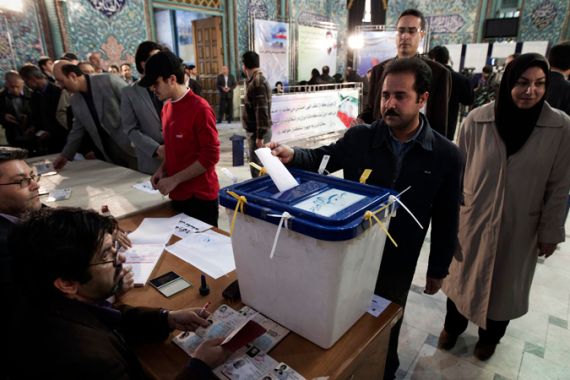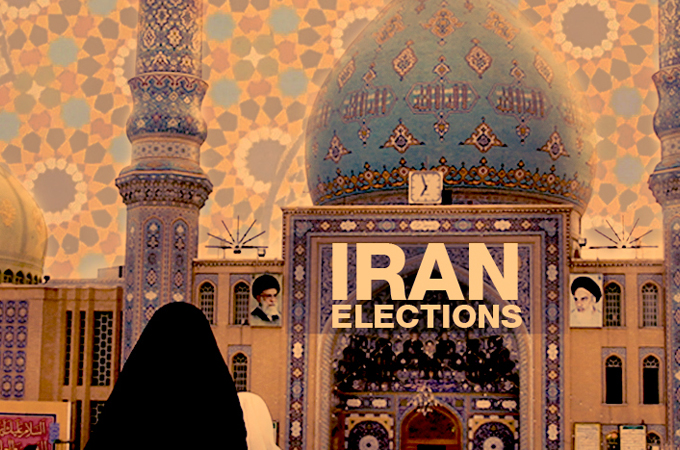Polls close in Iran’s legislative elections
Government says voter turnout exceeds expectations in elections seen as referendum on Tehran’s conservative leaders.

Polling stations have closed in Iran’s first national vote since 2009’s contested tenth presidential elections led to protests against President Mahmoud Ahmadinejad’s disputed second term.
The Islamic Republic’s conservative leaders called on people to vote in the Friday’s legislative elections for the “security of the country”, while reformists who accused authorities of fraud in 2009 called on their supporters to boycott.
Al Jazeera’s Zaina Khodr, reporting from Tehran, said voting times were extended by several hours because, according to the interior ministry, the turnout was larger than expected.
“[The vote] is more of a referendum than an election because voter turnout [is key],” Khodr said from a polling station as the day’s voting wrapped up.
“The authorities are hoping that if they managed to secure 60 per cent of voter turnout then they could declare this a success,” she added.
Conservative ‘establishment’
Turnout for the 290-seat Islamic Consultative Assembly, or Majlis, election is considered an important indicator of how much of the country backs the conservatives, who dominated the outgoing assembly.
 |
| Click here to see our spotlight on the elections |
A high turnout could provide a boost for a government under tremendous pressure both domestically and internationally.
Unemployment remains high, and international sanctions over the country’s nuclear programme have further increased economic pressure.
Iran’s Supreme Leader Ayatollah Ali Khamenei was the first to cast his vote as the polls opened.
“I believe this is a duty for us, and a right. We should exercise our right and carry out our duty,” he said after casting his ballot.
With the absence of the reformist coalition from the race, analysts believe the election has turned into a contest between factions within the increasingly divided conservatives.
Khodr said that the people turning out to vote are the ones “who support the Iranian establishment and leadership”.
Opposition absent
“But, of course, there are those who are boycotting the whole process altogether,” Khodr continued. “They support the green movement, the reformists, [who] aren’t fielding any candidates in this election.”
Iranian opposition leaders and former presidential candidates Mir-Hussein Mousavi and Mehdi Karroubi have both been under house arrest for over a year. Other reformists have called for a boycott, leaving the pool of 3,400 candidates mostly to the conservatives.
Reyhane, 25, and an opposition supporter, told the AFP news agency: “The outcome is predetermined. It’s of no difference if I vote or not. I learned this from the previous election, when our votes were stolen.”
While the results will not have much impact on foreign policy, they may go some way in determining the balance of power between the camps loyal to Khamenei and Ahmadinejad.
“The parliament has been traditionally very critical of Ahmadinejad. It is very important for this president to maintain some sense of power over the legislative body in his last year in office,” Al Jazeera’s Khodr said.
Economic concerns
Human rights organisations raised concerns about the government’s crackdown on dissent before the vote.
Amnesty International said the country had “dramatically” intensified restrictions on freedom of speech through a wave of arrests.
Human Rights Watch said on Thursday the country’s parliamentary elections would be unfair because of arbitrary disqualifications and other restrictions.
Several voters told the AFP that the most important issue for them was the economic difficulties they face in Iran as the country fights through Western sanctions imposed over Tehran’s alleged nuclear ambitions.
Samad, a 51-year-old cook who did not give his last name, stood in line for 45 minutes to fill out his ballot paper.
“I vote because it is my national duty,” he said. “But there are many problems in our country. We did not stage a revolution to have it become worse.”
Vahid Lavasani, a 34-year-old shopkeeper voting with his elderly mother, said: “I want the Majlis to resolve the economic issues and improve our relationship with the West. I also want them to rein in the president, so the country is united.”